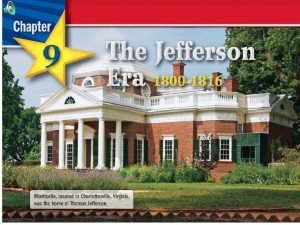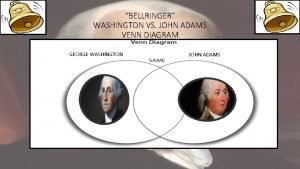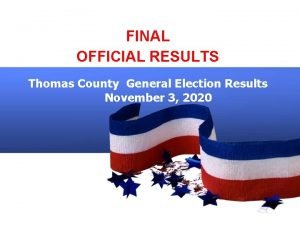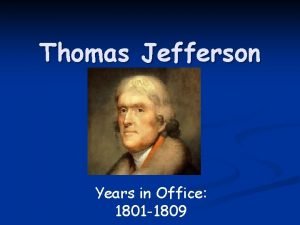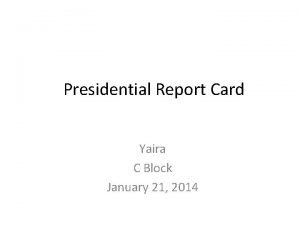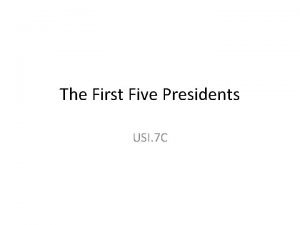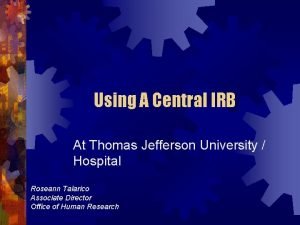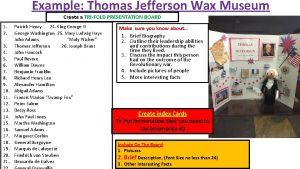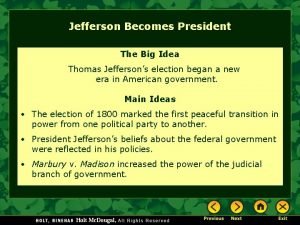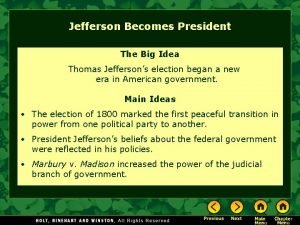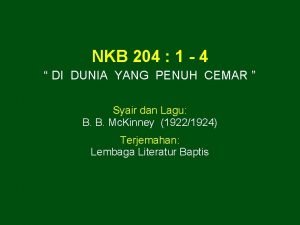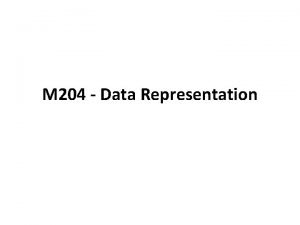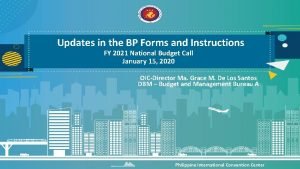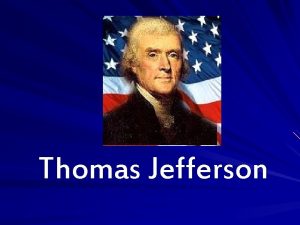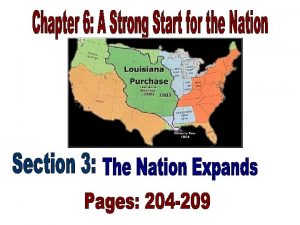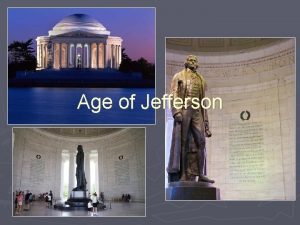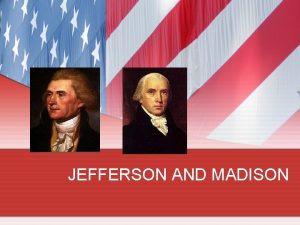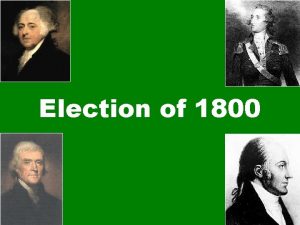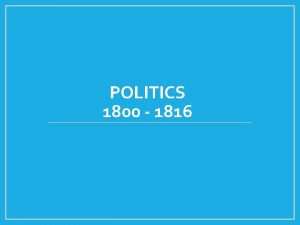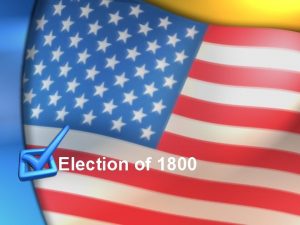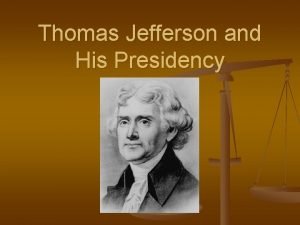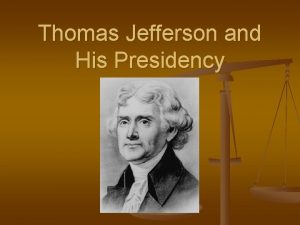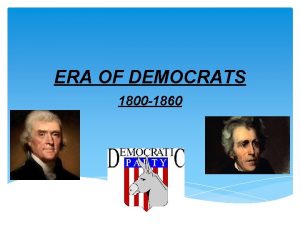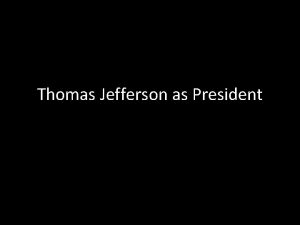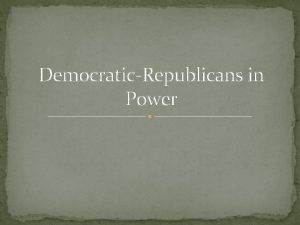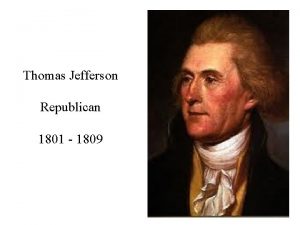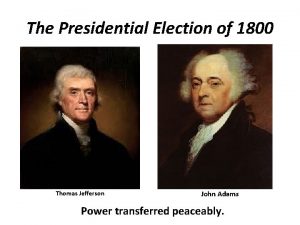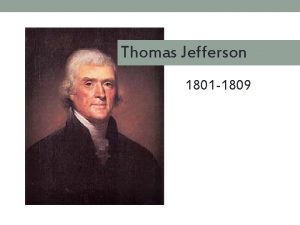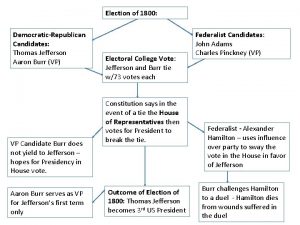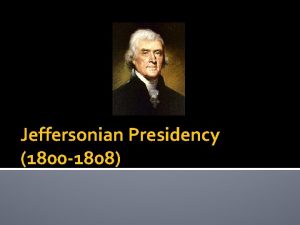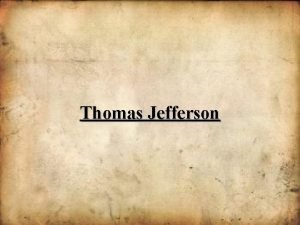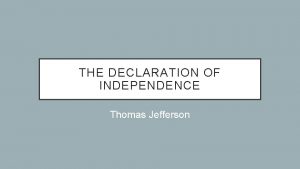THE ELECTION OF 1800 204 Thomas Jefferson and























- Slides: 23


• THE ELECTION OF 1800 (204) – Thomas Jefferson and Aaron Burr, both Republicans, defeated John Adams and Charles Pinckney for President – PROBLEM: Thomas Jefferson and Aaron Burr were in a time for number of electoral votes. – SO, if there is a tie the House of Representatives choose a president – 35 attempts to select a president failed – Preferring Jefferson over Burr, whom he considered “unprincipled and dangerous” Alexander Hamilton persuaded several Federalists in the House of Representatives to vote for Jefferson – Thus with the help of his former rival, Alexander Hamilton, Thomas Jefferson became president

• THE ELECTION OF 1800: (204) – To prevent future electoral crises, Congress proposed the 12 th Amendment (1804) which requires electors to vote for presidential and vice presidential candidates on separate ballots

• THE ELECTION OF 1800 (204) – Aaron Burr and Alexander Hamilton did not like each other. – In 1804, Hamilton publicly criticized Burr, who was then running for governor of New York. Burr’s demand for an apology led to a duel in which Burr shot and killed Hamilton

• THE FEDERALISTS AND THE JUDICIARY: (205) – The Federalists feel defeated and worried their ideas would be abandoned after losing the Election of 1800 – To help protect their ideas, the Federalists, pushed through the Judiciary Act of 1801. – The Judiciary Act of 1801: created a number of new circuit courts and federal judgeships. – President Adams worked late into the night of his last day as president, appointing Federalists to these posts – MIDNIGHT JUDGES

• THE FEDERALISTS AND THE JUDICIARY: (205) – President John Adams most significant appointment was not one of the “midnight judges” it was John Marshall. – President Adams made John Marshall, of Virginia, the Chief Justice of the Supreme Court.

• THE FEDERALISTS AND THE JUDICIARY: (205) – John Marshall, Chief Justice of the Supreme Court, established many basic principles of the US Constitutional law. – The principle of Judicial Review: the power of the courts to declare an act of Congress unconstitutional. – Marbury v. Madison: First time Judicial Review is used. President Jefferson and Secretary of State James Madison refused to allow William Marbury, on of the “midnight judges, ” to take office. • Marbury appealed to the Supreme Court to force President Jefferson to allow him to serve. The Court agreed that Marbury had the right to his appointment but ruled that it could hear the case only on appeal after it had gone through the lower federal courts. • By denying that the case could go straight to the Supreme Court, Marshall declared a part of the Judiciary Act of 1789 unconstitutional. – With this decision, Marshall initiated the Court’s most important role – that of final interpretation of the Constitution – JUDICIAL REVIEW

THE FEDERALISTS AND THE JUDICIARY: (205) • Chief Justice John Marshall also believed in loose construction of the Constitution, a position that put him at odds with President Jefferson • Mc. Culloch v. Maryland, an 1819 case in which the Supreme Court determined that the federal government had a right to legally establish a Bank of the United States

• FYI – George Washington was president from: 1789 -1797 – John Adams: (Federalist Party) wins election of 1796 to be our second president – Thomas Jefferson (Democratic-Republican Party) becomes our third president by winning 1800 presidential election

• In this period of United States History the “Democratic-Republican” party is also called the “The Republican Party. ” • Although Thomas Jefferson declared a Republican victory in the 1800 election the “Revolution of 1800, ” the transition of power was peaceful. – To fulfill his promises of moderation, Jefferson left some federalist programs untouched which included the National Bank and the debt payment plan, both of which he had once opposed – Jefferson was neutral in the area of foreign affairs – Jefferson supported a move that appealed strongly to Republican farmers by significantly by expanding U. S. landholdings

• THE LOUISIANA PURCHASE: 205 -209 – THE LOUISIAN TERRITORY (207) • Spain had held the Louisiana Territory since 1762 • Napoleon Bonaparte, French Ruler, who regained Louisiana from Spain • Thomas Jefferson is president when we receive the Louisiana Territory from France – Napoleon • At first we just want to purchase access to New Orleans or a port at the mouth of the Mississippi River • Jefferson told, James Monroe, to offer France TEN MILLION DOLLARS for New Orleans and west Florida. • However, Napoleon asked Monroe how much the United States would pay for all of Louisiana. • We buy the Louisiana Territory for FIFTEEN MILLION DOLLARS – thus we paid about 4 Cents an acre. • CALLED THE LARGEST LAND DEAL IN HISTORY


• Why did Napoleon give us such a great deal? – Here is why, 1. Napoleon chose to sell it because of his failure to build in empire in the Western Hemisphere. 2. To defend an empire in Louisiana, Napoleon needed a strong naval base in the West Indies. The most likely place was Saint Domingue – present-day Haiti- on the Island of Hispaniola. However, France had lost control of the colony after its African slaves had revolted in 1791. Under the Leadership of Toussaint-Louverture, African Slaves eventually took control of the whole colony. Toussaint. Louverture was a gifted military strategist, former slave, and grandson of an African chief

• Why did Napoleon give us such a great deal? – Here is why, 3. In 1802 a French attempt to regain Saint Domingue ended in disaster. Napoleon and his troops capture Toussaint. Louverture. The Haitians and the effects of yellow fever combined to drive the French out. With no foothold in the West Indies, Napoleon decided to the sell the territory and use the money to fund his armies in Europe.

• THE EVENTS IN HAITI THUS LED INDIRECTLY TO THE EXPANSION OF THE SIZE OF THE UNITED STATES. THEY ALOS LED TO A LARGE MIGRATION OF FRENCH HAITIAN IMMIGRANTS TO THE UNITED STATES, PARTICULARY TO THE NEW LOUISIANNA TERRITORY

• LEWIS AND CLARK (207 -208) – No one knows the exact size or boundary of the newly acquired Louisiana Territory – President Jefferson assigned the task of mapping the new territory to two skilled frontiersmen, Meriwether Lewis and William Clark. • With a crew of 45 explorers, the Lewis and Clark expedition left St. Louis in May of 1804. • Lewis and Clark, under the direction of president Jefferson, kept detailed journals of their travels. GREAT ATTENTION TO DETAIL IN THEIR WRITINGS


• LEWIS AND CLARK (207 -208) – Lewis and Clark hire a French Canadian fur trader and his Shoshone Wife, Sacagawea, as guides and interpreters – Sacagawea proved invaluable to the expedition – she showed them where to fish, hunt game, and find vegetables. As an interpreter, she helped the expedition obtain needed supplies at critical moments

• LEWIS AND CLARK (207 -208) – The Lewis and Clark expedition traveled up the Missouri River, crossed the Rocky Mountains, and canoed down the Snake and Columbia Rivers to the Pacific Ocean. – TOOK 2 ½ Years to complete the voyage. – They brought plant and animal specimens, animal bones, and pelts, and various soil and mineral samples back with them

• Zebulon Pike: explorer – Before Lewis and Clark could public the chronicles of their expedition, the reports or another explorer, Zebulon Pike, appeared in print

• Zebulon Pike: explorer – Pike visited the upper Mississippi Valley in 1805. He later traveled as far west as present-day Colorado, where he discovered the lofty mountain later named Pikes Peak in his honor – Pikes description gave Americans their First news of the lands beyond the Mississippi and helped spur expansion into Texas and the Southwest. – Pikes description of the Great Plains as a huge desert, led many people to view that region as unsuitable for settlement

• THE IMPORTANCE OF THE LOUISIANA PURCHASE (209) – What did the Louisiana Purchase affect the United States? – The Louisiana Purchase added all or part of 13 future states to the Nation. – The new size of the United States made us appear more important to other countries – In authorizing the purchase of Louisiana, Jefferson departed from his strict constructionist interpretation of the Constitution. He did not believe that the Constitution granted the executive branch the power to bring territories such as Louisiana into the United States. However, Jefferson did what he thought was best for the country. – The purchase removed the French threat from North America – It opened the interior of the continent to settlement – NATIONAL IDENTITY FORMING

 The election of 1800 showed that
The election of 1800 showed that Venn diagram george washington and king george iii
Venn diagram george washington and king george iii Thomas county election results
Thomas county election results Thomas jefferson resume
Thomas jefferson resume Thomas jefferson child hood
Thomas jefferson child hood What was thomas jefferson foreign policy
What was thomas jefferson foreign policy George washington bottle person
George washington bottle person Thomas jefferson report card
Thomas jefferson report card First five presidents graphic organizer answers
First five presidents graphic organizer answers Apush chapter 7 hammering out a federal republic
Apush chapter 7 hammering out a federal republic 12th amendment
12th amendment Benjamin banneker letter to thomas jefferson annotation
Benjamin banneker letter to thomas jefferson annotation Jefferson irb
Jefferson irb Wax museum trifold
Wax museum trifold Thomas jefferson
Thomas jefferson Thomas jefferson becomes president
Thomas jefferson becomes president Thomas jefferson big idea
Thomas jefferson big idea Pathologist and anthropologist
Pathologist and anthropologist Szpv 204
Szpv 204 Di dunia yang penuh cemar
Di dunia yang penuh cemar What is a bit
What is a bit Gloucester county board of health
Gloucester county board of health Ipsd 204 accelerated math
Ipsd 204 accelerated math Bp form 202-a
Bp form 202-a
